
Water Alternatives-An Interdisciplinary Journal on Water Politics and Development
Scope & Guideline
Bridging Disciplines to Transform Water Governance
Introduction
Aims and Scopes
- Water Governance and Policy:
Analyzes the frameworks, institutions, and policies that shape water management and governance, including the implications of these frameworks for equity and access. - Hydropolitics and Conflict:
Explores the political dynamics surrounding water resources, particularly in transboundary contexts, and how these dynamics affect international relations and local communities. - Environmental Justice and Sustainability:
Focuses on the social and environmental justice aspects of water management, emphasizing the need for sustainable practices that consider marginalized communities. - Quantification and Measurement in Water Management:
Investigates the politics of quantifying water resources, including how metrics influence governance practices and perceptions of water scarcity. - Community and Local Practices:
Highlights grassroots movements and local practices in water management, emphasizing the role of communities in shaping water governance and resource use. - Interdisciplinary Approaches:
Encourages the integration of diverse methodologies, including qualitative and quantitative research, to provide a holistic understanding of water issues across different contexts.
Trending and Emerging
- Climate Justice and Water Equity:
An increasing number of papers are addressing the intersection of climate change and water justice, emphasizing the need for equitable resource distribution and adaptation strategies in vulnerable communities. - Hydrosocial Perspectives:
Research is increasingly adopting hydrosocial frameworks that examine the interconnectedness of water, society, and power dynamics, highlighting how social relationships shape water governance. - Community-Based Water Management:
There is a growing emphasis on grassroots and community-led initiatives in water management, with a focus on participatory governance and the role of local knowledge. - Critical Analysis of Water Metrics:
An emerging theme involves scrutinizing the implications of water quantification and metrics, exploring how these practices can obscure complexities and impact governance. - Transboundary Water Cooperation:
Research on transboundary water governance is gaining traction, reflecting a growing recognition of the importance of collaborative approaches to manage shared water resources.
Declining or Waning
- Technological Optimism in Water Solutions:
There has been a noticeable decline in papers centered solely on technological solutions, such as large-scale infrastructure projects, which may indicate a shift towards more critical perspectives on technology's role in water management. - Traditional Water Management Practices:
Research focusing on historical or traditional water management practices appears to be waning, possibly as newer, more pressing issues related to climate change and urbanization take precedence. - Single-Dimensional Water Governance Models:
The journal seems to be moving away from publishing works that analyze water governance through overly simplistic or linear models, favoring more complex, multi-dimensional analyses. - Overemphasis on Economic Valuation:
There is a declining trend in papers that primarily focus on the economic valuation of water resources, suggesting a shift towards more qualitative analyses that emphasize social and environmental factors.
Similar Journals
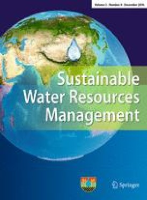
Sustainable Water Resources Management
Exploring the nexus of water, energy, and sustainability.Sustainable Water Resources Management is an esteemed journal focusing on the critical field of water resource management in the context of sustainability. Published by Springer International Publishing AG, this journal serves as a vital platform for researchers, policymakers, and practitioners to disseminate cutting-edge research and innovative practices aimed at addressing global water challenges. With an impressive impact factor aligned with its Q2 ranking in Water Science and Technology and Q3 in Renewable Energy, Sustainability, and the Environment, it maintains a robust reputation in its field, evidenced by its Scopus rankings. Covering a diverse range of topics from integrated water resource management to the nexus between water and energy, Sustainable Water Resources Management is committed to fostering knowledge exchange and encouraging interdisciplinary dialogue among its audience. This journal, operating under strict academic rigor, plays an essential role in advancing sustainable practices and is open from 2015 to 2024, making it a relevant resource in today’s rapidly evolving environmental context.

Water Conservation Science and Engineering
Transforming Water Challenges into Engineering SolutionsWater Conservation Science and Engineering, published by SPRINGERNATURE, is a vital academic journal dedicated to advancing the fields of environmental engineering, ocean engineering, waste management, and water science and technology. Since its inception in 2016, the journal has quickly established itself within the academic community, achieving a commendable Q3 ranking across multiple categories in 2023. With an ISSN of 2366-3340 and an E-ISSN of 2364-5687, it is accessible to a global readership eager to explore the latest research and innovations in water conservation and sustainable practices. Although currently not open access, the journal is committed to publishing high-quality scholarly articles that provide insights into effective water management strategies, innovative engineering solutions, and the critical importance of preserving our water resources. Based in Singapore, Water Conservation Science and Engineering aims to foster interdisciplinary collaboration among researchers, professionals, and students, making it an essential resource for anyone passionate about environmental sustainability and preservation.
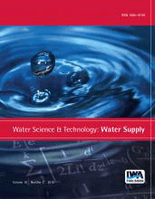
Water Supply
Shaping the future of water supply research.Water Supply is an esteemed journal published by IWA PUBLISHING that plays a pivotal role in the field of water science and technology. With an ISSN of 1606-9749 and an E-ISSN of 1607-0798, this journal has been a key resource for researchers and professionals since its inception in 2001. Now covering a wide range of topics until 2024, it is recognized for its impactful contributions, holding a Q2 ranking in the Environmental Science: Water Science and Technology category, and currently stands at rank #125 out of 261 in Scopus, reflecting its relevance and influence in the academic community. The journal aims to disseminate significant research findings and innovations in water supply management, ensuring that professionals and students are equipped with the latest knowledge and practices in the sector. Despite not being an open-access journal, Water Supply continues to attract high-quality submissions that enhance our understanding and preservation of vital water resources. For those invested in sustainable water practices, this journal is an invaluable tool for continued learning and advancement.
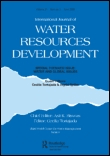
INTERNATIONAL JOURNAL OF WATER RESOURCES DEVELOPMENT
Connecting expertise with practice in water resources management.The INTERNATIONAL JOURNAL OF WATER RESOURCES DEVELOPMENT, published by ROUTLEDGE JOURNALS, TAYLOR & FRANCIS LTD, stands as a premier platform for disseminating cutting-edge research in the fields of water resources management and sustainable development. With an impressive impact factor indicated by its Q1 ranking in both Development and Water Science and Technology categories, this journal is pivotal for researchers and professionals seeking to advance their understanding of water-related challenges and solutions. Covering a broad spectrum of topics, it features contributions from leading experts, making it an essential resource for both academic inquiry and practical application. Although it does not currently offer Open Access, the journal's rigorous peer-review process ensures high-quality scholarship from 1983 to the present, reinforcing its role in shaping policies and practices globally. The journal is indexed in Scopus with notable rankings in Social Sciences and Environmental Science, highlighting its influence and reach within these vital sectors.
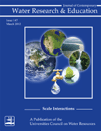
Journal of Contemporary Water Research & Education
Advancing Knowledge for Sustainable Water SolutionsJournal of Contemporary Water Research & Education is a leading publication in the field of water resources, committed to advancing the understanding and management of water-related issues through innovative research and education. Published by WILEY, this journal serves as a vital platform for researchers and practitioners to disseminate knowledge on contemporary water challenges, management strategies, and environmental policies. With an ISSN of 1936-7031 and an E-ISSN of 1936-704X, it provides a wealth of peer-reviewed articles that are essential for anyone interested in sustainable water resource practices. Although it does not currently operate under an open-access model, the journal's comprehensive content remains accessible through various institutional and personal subscriptions. As we face increasing water scarcity and quality issues globally, the Journal of Contemporary Water Research & Education strives to foster collaboration and innovation, playing a pivotal role in equipping scholars, professionals, and students with the knowledge necessary to tackle these pressing challenges.

Water Economics and Policy
Fostering Interdisciplinary Dialogue on Water Resource ManagementWater Economics and Policy is a leading academic journal specializing in the interdisciplinary examination of water-related economic issues and policy frameworks. Published by WORLD SCIENTIFIC PUBL CO PTE LTD in Singapore, this journal serves as a pivotal platform for sharing innovative research, empirical studies, and theoretical developments that address the complex interactions between water resources management, economic sustainability, and policy formulation. With its impact factor reflecting its growing influence in the field, Water Economics and Policy is indexed in several key categories, ranking in the third quartile in areas such as Business and International Management, Economics and Econometrics, and Water Science and Technology. Launched in 2015, the journal embraces an open-access approach to enhance the dissemination of knowledge and insights among researchers, policymakers, and practitioners. Its commitment to fostering dialogue on critical water issues makes it an invaluable resource for anyone seeking to advance their understanding of water economics and contribute to the sustainable management of water resources.

Water Resources and Industry
Driving Change through Open Access Water ResearchWater Resources and Industry, published by Elsevier, stands at the forefront of research in the critical fields of water science and technology, as well as geography, planning, and development. With an impressive 2023 impact factor that places it in the Q1 category for both Geography and Water Science on a global scale, this journal is a vital resource for academics, professionals, and students seeking to advance their understanding of water-related issues impacting industries worldwide. Since its inception in 2013 as an Open Access journal, it has fostered innovative research and practical solutions to challenges in water resource management. Located in the vibrant academic hub of Amsterdam, the journal encourages submissions that cover a broad spectrum of topics, from sustainable practices and policy development to technological advancements in water treatment and distribution. By making its research publicly accessible, Water Resources and Industry not only contributes to scholarly discourse but also empowers stakeholders to implement evidence-based strategies for water sustainability, thereby enhancing its relevance and impact in today's world.

Journal AWWA
Championing Excellence in Water Science Research Since 1946.Journal AWWA, published by WILEY, serves as a vital platform in the fields of Chemistry and Water Science and Technology. Established in 1946 and with a rich history extending to 2024, this journal is dedicated to the dissemination of innovative research and practical insights that address the pressing challenges associated with water quality and management. Although currently not an open-access publication, it provides important contributions to a diverse audience, including researchers, industry professionals, and students dedicated to advancing knowledge in water sciences. With a respectable Q3 ranking in both the Chemistry and Water Science categories, as well as competitive Scopus rankings, Journal AWWA consistently delivers peer-reviewed articles that foster critical discussions and promote sustainable solutions within the community. The journal's commitment to excellence ensures that it remains a significant resource for those engaged in environmental science and technology.

Journal of Water Management Modeling
Innovating Water Management for a Sustainable FutureThe Journal of Water Management Modeling, published by COMPUTATIONAL HYDRAULICS INT, stands as a pivotal resource in the fields of Civil and Structural Engineering, Geography, Planning and Development, and Water Science and Technology. With an ISSN of 2292-6062, this Canadian-based journal has earned its reputation by exploring innovative modeling approaches to enhance water management, crucial in addressing today's environmental challenges. Despite its current Q3 status in Civil and Structural Engineering and Water Science categories, alongside a respectable Q2 rank in Geography, the journal is committed to advancing knowledge and fostering collaboration among researchers, practitioners, and students passionate about the sustainable management of water resources. The journal operates on an open-access model, ensuring research is readily available to a broad audience, and has converged its editorial focus from 2018 to 2024, continuously adapting to emerging trends and technologies within the discipline. As a part of the global conversation regarding effective water management, it plays a vital role in informing policies and practices that impact communities and ecosystems alike.
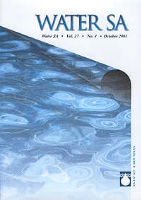
WATER SA
Fostering interdisciplinary dialogue for water solutions.WATER SA, published by the WATER RESEARCH COMMISSION, serves as a pivotal platform for interdisciplinary research in the areas of water science and technology. With an ISSN of 0378-4738 and an E-ISSN of 1816-7950, this open-access journal has been committed to disseminating knowledge since 2005, ensuring that research is freely accessible to a global audience. As of 2023, it holds a Q3 ranking in several key categories including Applied Microbiology and Biotechnology, Management, Monitoring, Policy and Law, Waste Management and Disposal, and Water Science and Technology. These rankings reflect its significant contribution to these disciplines, particularly in South Africa where it is based. With a history dating back to 1976 and converging research efforts extending through 2024, WATER SA aims to illuminate pressing water-related challenges and foster innovative solutions through rigorous scientific inquiry. Researchers, professionals, and students interested in the sustainability and management of water resources will find its comprehensive portfolio essential for advancing their work and understanding in an increasingly critical field.